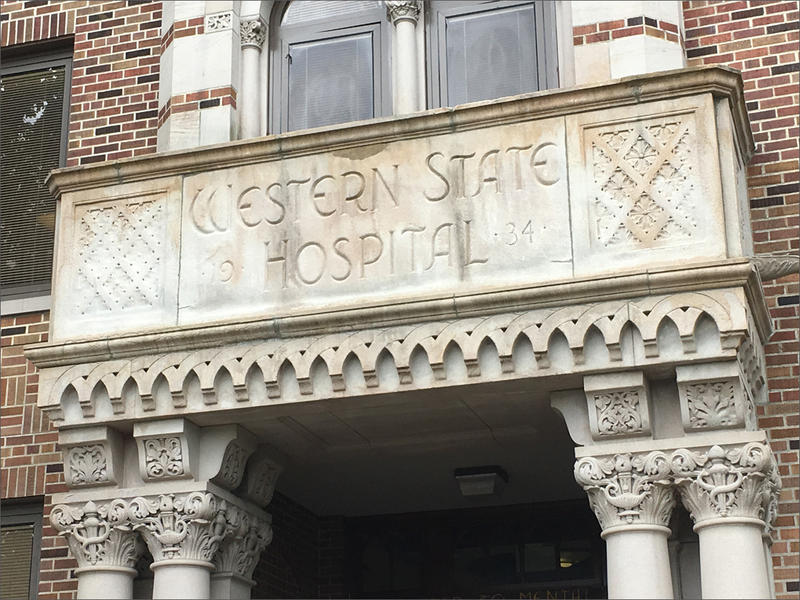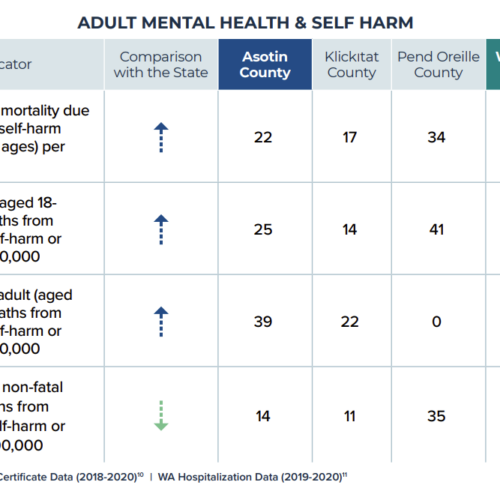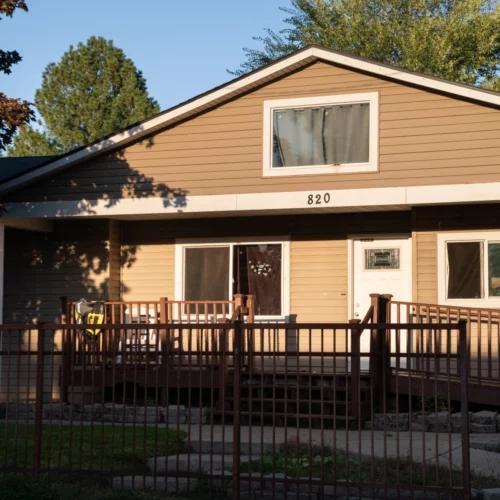
Suicide Risk Prompts Emergency Measures At Western State Hospital
Listen
Federal inspectors have found serious safety violations at Western State Hospital that could increase the chances of patient suicides. The finding this week has the potential to further imperil $65 million in annual federal funding the state receives to operate the 857-bed psychiatric hospital near Tacoma.
In a memo on Wednesday to all staff, top officials at the hospital said surveyors from the Centers for Medicare and Medicaid Services had found exposed fire suppression devices that could give patients a means to hang themselves.
“CMS identified a serious risk of harm to patients due to ligature risks from the fire system in patient care areas of Building 21 South Hall,” said the memo, a copy of which public radio obtained. Building 21 is where civil, or non-criminal, patients are treated on five different wards. Typically a ward has 30 patients.
A CMS finding of serious risk of harm is also known as an “immediate jeopardy.”
In a statement Thursday, the Washington Department of Social and Health Services said it was submitting a plan to address the safety concerns. If that plan is accepted by CMS, the citation would be rescinded. If not, the hospital could lose Medicare funding within 23 days.
According to the all-staff memo, suicide concerns related to the sprinkler system were found in two patient seclusion rooms as well as in patient bedrooms, bathrooms and shower rooms. The memo said the seclusion rooms are now off limits to patients.
It was not immediately clear how the closure of the seclusion rooms would impact patient care and whether it would result in patients who are acting out being restrained instead.
In the other areas where protruding fire sprinklers were found, staff are now required to check on patients every 15 minutes. Patients at risk for suicide who are placed in those areas will be put on “close or constant monitoring,” according to the memo.
An agency spokeswoman later explained that the issued identified by CMS was a fire suppression fixture that had been retrofitted, but was not flush with the ceiling “and could pose a risk of a patient hanging themselves.”
On Thursday, the Western State Incident Command Center sent an email notifying staff that tables and chairs had been removed from the patios at the Center for Forensic Services because of concerns that a patient could stand on them to reach a sprinkler head.
“Under no circumstances, should the tables, chairs or replacements for them be located on the patios,” the email said, a copy of which was forwarded to public radio.
The hospital said it had no record going back to 1995 of a patient suicide involving a fire safety device. The last patient to die by suicide at Western State Hospital was in August 2015.
The safety violations come as a team of 22 federal surveyors began re-inspecting the hospital last week as part of a turnaround plan that is approaching the two-year mark. The sprawling hospital, which serves civil and forensic patients, must meet standards on 26 federal “Conditions of Participation” in order to continue receiving federal funding.
Originally, the state was given 13 months to comply with federal standards, but has since received several extensions. This latest survey will likely determine whether Western State retains or loses federal certification. A final report is expected at the end of June.
Since 2015, Western State Hospital has been under scrutiny for serious repeat violations that inspectors said put patients and staff at risk. The litany of troubles included violent assaults on patients and staff, the 2016 escape of two high-risk patients and scores of unauthorized patient “walkaways.”
A “root cause” report in 2016 identified ineffective management, staff reductions and turnover leading to patients who felt “neglected” and a “culture of helplessness” among staff. A review by the Department of Corrections also found numerous security gaps including 25,000 master keys unaccounted for.
In recent years, new management has taken over the hospital and the state Legislature has put hundreds of millions of dollars into shoring up operations, including raising salaries in order to recruit more workers to address deep staffing shortages. But that investment has fallen short of what Gov. Jay Inslee has said is needed to turn around the sprawling, decades-old hospital complex.
Earlier this month, DSHS Secretary Cheryl Strange, who previously served as the CEO of Western State, indicated that the hospital faced an uphill battle to comply with federal standards.
“Every day is a lift, every day is a focus on changing the culture, the violence,” Strange said.
She noted that a mock inspection in advance of the formal CMS inspection “showed us we still have quite a lot of work to do around the physical plant.”
On any given day, Strange said, there are 40 to 70 contractors working on upgrades to the hospital. Those upgrades have included eliminating protrusions that patients could use to hang themselves. It’s not clear why the problem was not eliminated in the areas where inspectors found concerns. Many of the hospital’s buildings, including Building 21 where the safety violations were found, are decades old and difficult to retrofit.
Of Western State’s roughly 857 patients, about a third are forensic patients who have been charged with a crime and been found not guilty by reason of insanity. The remaining patients have been civilly committed to the hospital because a judge has found they pose a risk of harm to themselves or others.
Inslee and a bipartisan group of lawmakers have announced plans to stop admitting civil patients to Western and Eastern State Hospitals by 2023. Instead those patients would be served in new 16-bed facilities around the state, allowing the state hospitals to focus on serving forensic patients.
The state has accrued more than $55 million in fines for not meeting court-ordered timelines to evaluate and treat criminal defendants who are not competent to stand trial. That has led to mentally ill defendants languishing in jail cells while they await those services from the state hospitals.
Currently, 228 people are awaiting a forensic bed at Western State and 92 are on the waitlist for a civil bed.
Copyright 2018 Northwest News Network
Related Stories:

Asotin County assessment shows needs in mental health, housing, substance use treatment
An assessment by the Asotin County Health District shows that mental health, housing and aging in place, along with substance use, are some of the largest health issues facing the community.

Rape, beatings and racial slurs: None of it was enough to shut down this Idaho youth facility
Employees at Cornerstone Cottage alerted state officials to the dangers, only to be fired themselves Cornerstone Cottage opened in 2016 in Post Falls, Idaho, a booming bedroom community 25 miles

Wildfires can impact your mental health
Wildfires can be frightening and result in overflowing emotions. Fear, anxiety and even depression can arise before, during and after these natural disasters, but specialists say there are still resources to cope with the trauma that environmental emergencies can cause.















